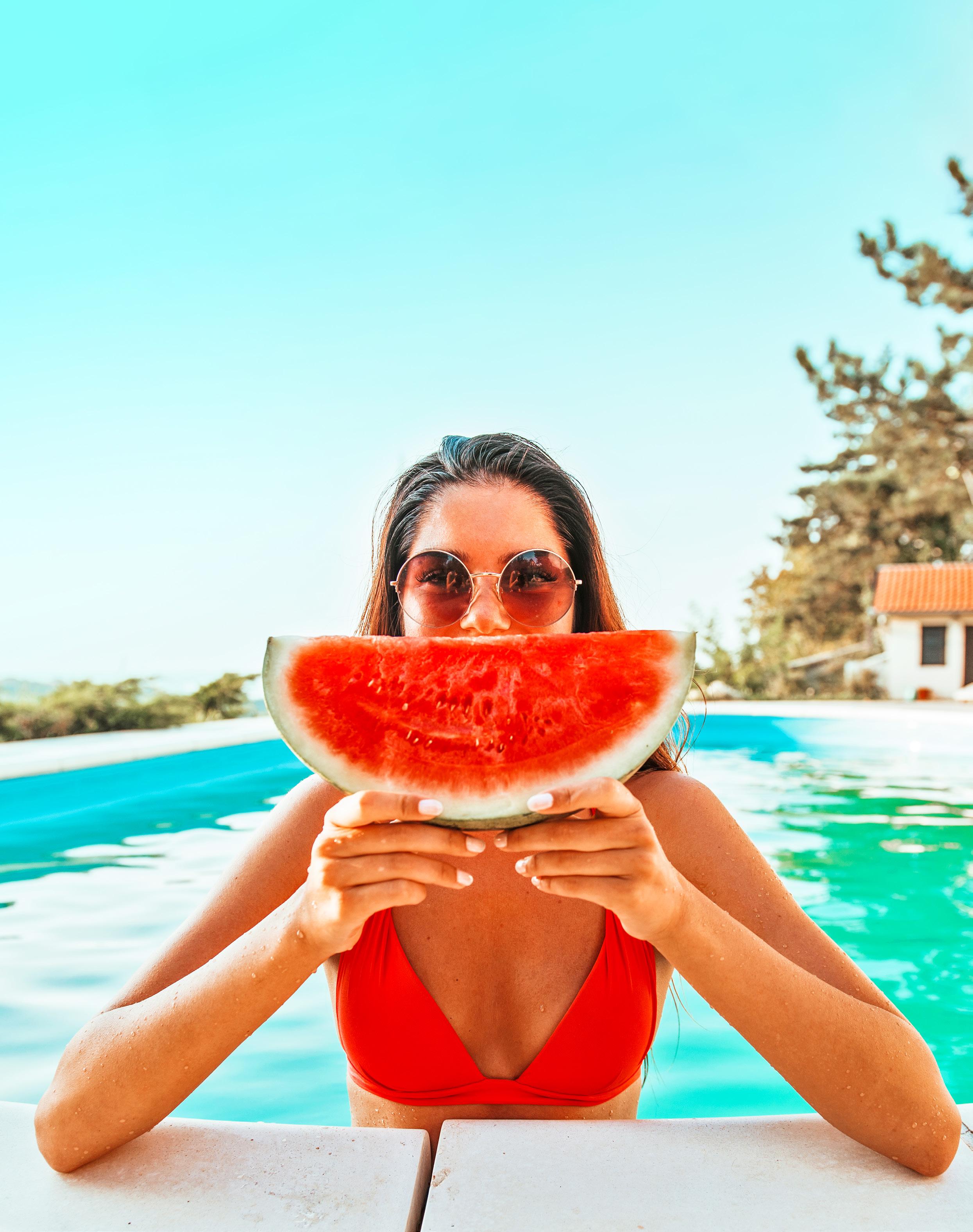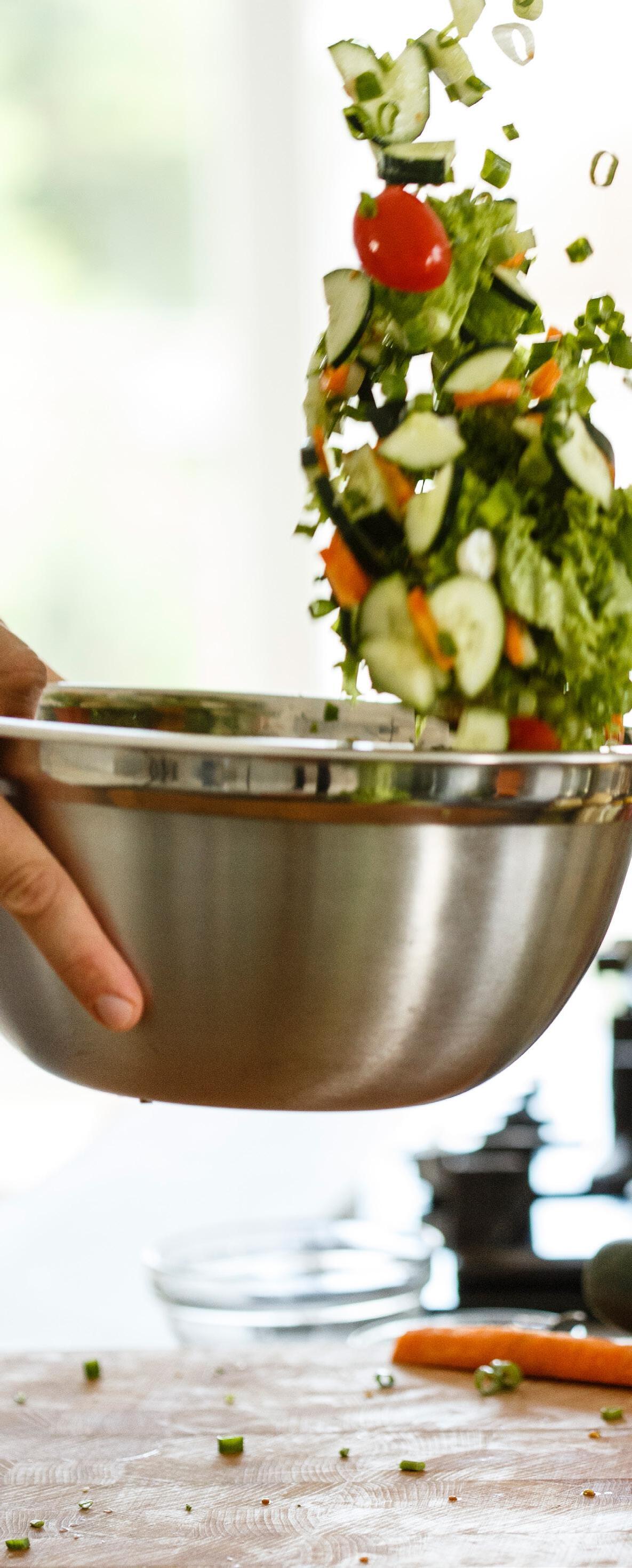MINDFUL EATING AND NUTRITION
WAYS TO EAT MINDFULLY
n SLOW DOWN! Chew your food well and take time to pause while you’re eating by putting your cutlery down between each mouthful.
n FOCUS! Try not to eat while you are on the phone, reading or watching TV so that you can relax and enjoy your food in the moment.
n LISTEN! Practise recognising when you feel hungry by thinking about what it feels like in your body to feel hungry. When you eat, start with the amount of food you expect to make you feel comfortably full. Try to avoid periods of extreme hunger or extreme fullness. Remember you can always eat more if you still feel hungry.
n THINK! Recognise when you are eating for reasons other than physical hunger. Sometimes emotions can trigger hunger; therefore, it is important to identify what drives your eating.

WHY BE MINDFUL?
Mindful eating offers the chance to appreciate your food more and make a better connection with it. Some studies suggest that mindful eating can help support emotional eating and binge eating, promoting a healthier relationship with food. Eating mindfully may also help regulate appetite, aid digestion and make eating an enjoyable and pleasurable experience.
Mindful eating is not about restricting yourself – it is about enjoying and appreciating food. Although some people may find that eating more mindfully leads to weight loss, doing so with the expectation or intention to lose weight can be self-defeating.

Your Health Newsletter | | 3 www.healthpartnersgroup.com
HEALTHY EATING
On average, the diet of UK adults provides more than enough of most nutrients, but intakes of some vitamins and minerals have been shown to be low in some age/sex groups, e.g. iron in young women.*

Try to eat a wide variety of foods from the main food groups, in the right proportions, consuming the right amount of food and drink to achieve and maintain a healthy body weight (people with special dietary needs or a medical condition should ask their doctor or a registered dietitian for advice).
The EATWELL Guide advises that to have a healthy, balanced diet, people should try to:
n Eat at least five portions of a variety of fruit and vegetables every day;
n Base meals on 50% protein and complex carbohydrates and 50% salad and vegetables;
n Have some dairy or dairy alternatives (such as soya drinks);
n Eat less meat/processed meat and replace with beans, pulses, fish, eggs and other lean protein sources;
n Choose unsaturated oils and spreads and eat them in small amounts;

n Drink plenty of water or unsweetened drinks – at least six to eight glasses a day.
If you're consuming food and drink that are high in fat, salt and sugar, have these less often and in small amounts. Eating five portions of fruit and veg is not as hard as it sounds!
A single portion of fruit is one apple, banana, pear or similar-sized fruit or a tablespoon of dried fruit, such as raisins.
Try the following to increase your fruit and veg intake: swap your mid-morning biscuit for a banana and add a side salad to your lunch; have a portion of vegetables with dinner and fresh fruit with plain, lower-fat yoghurt for dessert.

* Women, trans men, people who are non-binary who were assigned female at birth, and cis gender


4 | | Your Health Newsletter www.healthpartnersgroup.com
“Mindful eating is not about restricting yourself – it is about enjoying and appreciating food.”
Health Your
RECIPE:
SUBLIME SUMMER SALAD
To assemble this summer salad, simply combine everything in a large bowl, mixing to ensure the dressing coats the leaves – alternatively, you can put the dressing on the side and drizzle on top if you wish.
Romaine lettuce, chickpeas, chopped walnuts, pumpkin seeds, dried cranberries and avocado are all ingredients that not only tantalise our taste buds but also offer an array of nutritional benefits.
Starting with romaine lettuce, it is a leafy green vegetable packed with vitamins A, C and K. These vitamins support eye health, strengthen the immune system and promote healthy blood clotting. Additionally, romaine lettuce provides a good amount of dietary fibre, aiding in digestion and maintaining a healthy weight. Romaine lettuce is also a sturdier variety of lettuce, meaning that it will stand up to being kept in a lunchbox or prepared in advance and put in the fridge.
Chickpeas (seen here being grown in a field and ready for harvesting) are an excellent source of plant-based protein and dietary fibre. They offer a sustainable alternative to animal protein and help promote satiety, or fullness, in a nutritious way. Chickpeas also contain essential minerals like iron, magnesium and potassium, which support energy production and heart health.

Chopped walnuts and pumpkin seeds bring textural variety and a wealth of nutritional benefits. Walnuts are rich in omega-3 fatty acids, which are beneficial for brain health, heart health and reducing inflammation in the body.
MINDFUL EATING AND NUTRITION
For the salad:
n Two heads of Romaine lettuce, chopped;
n One can of chickpeas, drained and rinsed;
n 2 tablespoons (30g) chopped walnuts;
n 2 Tablespoons (30g) pumpkin seeds;
n 2 Tablespoon (30g) dried cranberries;
n 1 avocado, cut into cubes;
n 1 small bunch fresh coriander, chopped.
For the dressing:
n (50 ml) olive oil;

n (50 ml) fresh lemon juice;
n 1 teaspoon honey;
n Salt and pepper to taste;
n 1 teaspoon chipotle chilli flakes (optional).
Your Health Newsletter | | 5 www.healthpartnersgroup.com
Pumpkin seeds, on the other hand, are a fantastic source of zinc, magnesium and antioxidants. These minerals support immune function, bone health and promote healthy skin.
Dried cranberries provide a burst of sweetness to any salad while offering a variety of health benefits. These little gems are packed with antioxidants and phytochemicals, which protect the body against cellular damage and reduce the risk of chronic diseases like cancer and heart disease. Additionally, cranberries are known for their ability to support urinary tract health.
Finally, let's not forget about avocado, the creamy and nutritious fruit. Avocados are rich in heart-healthy monounsaturated fats, which help lower LDL cholesterol levels and promote positive heart health. They are also a great source of vitamins

E and B-6, folate and potassium. These nutrients support healthy skin, brain function and help regulate blood pressure. When combined, romaine lettuce, chickpeas, chopped walnuts, pumpkin seeds, dried cranberries and avocado create a vibrant and nutrient-dense salad that nourishes both the body and the taste buds.
Whilst this salad is nourishing and satisfying by itself, it also works well when combined with some grilled salmon or chicken for extra protein, or wholegrain couscous or sourdough bread if you wish to add some nutritious carbohydrate.
Sources: British Nutrition Foundation, NHS, Eatwell Guide, The Association of UK Dieticians


6 | | Your Health Newsletter www.healthpartnersgroup.com Health Your
Health Your MINDFUL
EATING AND NUTRITION
TRAVEL AND HOLIDAY HEALTH
TRAVEL AND HOLIDAY HEALTH

How glorious that summer is finally here! As we enter the summer holidays, we should be mindful of the different challenges that might crop up if we travel – either here in the UK or further afield.
Holidays and travel in general have the potential to present certain health challenges, especially if you have pre-existing conditions. Our attitude to risk and behaviour can also change on holiday, which can increase our vulnerability to accidents.
These challenges may include, but are not limited to:
n Infection – including COVID-19;
n Jet lag;
n Deep vein thrombosis (DVT);
n Sunburn/heat stroke;
n Accidents – hazardous sports, drowning, road traffic accidents;
n Security issues.
Most trips will be low risk, but the following factors can increase risk:
n Travel to remote or undeveloped areas;
n Poor local infrastructure;
n Restricted access to medical facilities;
n Extreme climatic conditions;
n Transportation challenges;
n People’s behaviours.
Your Health Newsletter | | 7 www.healthpartnersgroup.com
Before the trip:
n Read up about the local area. Take a look at the FCO site to get advice about travelling abroad, including the latest information on COVID-19, safety and security, entry requirements and travel warnings https://www.gov.uk/foreigntravel-advice;

n Get medical advice about immunisations and prophylactic/preventative medication, e.g. for malaria, well ahead of the trip;
n Discuss any outstanding concerns and the impact that travel may have on your preexisting health conditions with your GP/ practice nurse;
n Make sure that you have enough medication for your trip, including medication rescue packs for those that may need them;
n Consider buying a traveller’s medical kit, extra masks, gloves, hand sanitisers and disinfectant wipes;
n Take out travel insurance/ get a UK Global Health Insurance Card (replaces EHIC). Find out more https://www.gov.uk/globalhealth-insurance-card;


n Find out what the COVID-19 requirements are for your flight, arrival at your location, departure and arrival back in the UK and take the steps you need to in a timely manner;
n Give yourself plenty of time to get to the airport.
In order to minimise the risk of DVT (increased risk for flights of more than five hours):
n Minimise alcohol intake and keep well hydrated;
n Maintain mobility and exercise;
n Wear compression stockings for those medically advised to do so (note poorly fitted ones can increase the risk of DVT);
n Avoid tranquilising medication.
Note that the risk of DVT increases with smoking, recent surgery (within ten days), pregnancy, family history of DVT, oral contraceptive pill and hormonereplacement therapy. There is no clear evidence of benefit in taking aspirin for the prevention of travel-related DVT.
https://media.istockphoto.com/id/1217889729/photo/man-running-outdoors-running-checking-smart-watch-taking-a-break.jpg?s=612x612&w=0&k=20&c=jNB3H2ZiFnhaW1pQJdZ0gVMP1GajiOTuOZe76G0CkAk= 8 | | Your Health Newsletter www.healthpartnersgroup.com
Health Your
“Implementing some common sense can help to mitigate the risks.”
TRAVEL AND HOLIDAY HEALTH

Upon arrival:
n Jet lag: this starts to have an effect if you have travelled across three time zones. The resulting fatigue can affect your concentration and decision making. Allow time to acclimatise upon arrival;
n Traveller’s diarrhoea is the most common traveller’s health problem. Avoid/mitigate by eating freshly cooked food, eating fruit that can be washed or peeled, drinking safe water or ice and consider self-treatment antibiotics in your travel kit;

n Pay particular attention to alcohol, drug use and sexual behaviours while away from home;
n Take and wear sunscreen as appropriate;
n If you are in an area endemic for malaria remember ABCD:
• Awareness;
• Bite prevention;
• Chemoprophylaxis (malaria tablets);


• Diagnosis and treatment.
And, most importantly...enjoy yourself!
Sources: NICE, NHS, Gov.UK
https://media.istockphoto.com/id/1217889729/photo/man-running-outdoors-running-checking-smart-watch-taking-a-break.jpg?s=612x612&w=0&k=20&c=jNB3H2ZiFnhaW1pQJdZ0gVMP1GajiOTuOZe76G0CkAk=
www.healthpartnersgroup.com Your Health Newsletter | | 9
THE BIG LISTEN
Why is 24/7 an important date? 24/7 is Samaritans Awareness Day. Samaritans identify with this date because they’re here to listen 24/7.
Samaritans in the UK and Republic of Ireland host suicide awareness raising events around 24th July each year. Their aim is to publicise their round the clock phone line to people who are struggling with their mental health, nationwide.

The work that Samaritans do is crucial. More than 6,000 people across the UK and Ireland take their own lives each year, and Samaritans play a key role in raising suicide awareness.
So how common are mental health difficulties?
One in four will experience a mental health difficulty each year in England. More than 1 in 20 people will make a suicide attempt at one point in their lives. And many more will contemplate suicide.
If in crisis, knowing that organisations like Samaritans are waiting for your call can prevent people from acting on suicidal plans and pick up the phone to seek support instead.
With these figures in mind, the chances are that you or someone you know has been affected by suicide either directly or indirectly. Therefore, it has never been more important to know how to help yourself and how to help others.
So why is it named “The Big Listen”?
Samaritans encourage people in crisis to get in touch because often just having a conversation and feeling heard and listened to can alleviate some distress, even if nothing is resolved. Better still, talking about what’s bothering you can give you a new perspective on your situation or help you to see things differently.
feeling better.
Have you been feeling distressed recently? Maybe you have been in crisis before or wondered if you should talk to someone and how you can take the next step. Keeping the theme of “The Big Listen” in mind, seeking support for your mental health in the form of talking therapy could help.


Psychological therapies have a robust evidence base to suggest clinical effectiveness; this means most people who receive evidence-based treatments report reduction in their symptoms and increased ability to function in their lives (APA, 2016).
There are many kinds of talking therapies but only those with a strong evidence base such as cognitive behavioural therapy are available through Employee Assistance Programmes (EAPs) or your GP.
10 | | Your Health Newsletter www.healthpartnersgroup.com
Talking to the Samaritans or someone you
Health Your
“Talking about what's bothering you can give you a new perspective.”
Taking the first step can be daunting, so if you’re unsure, view it as a nothing-to-lose approach.
Are you feeling OK, but you’re worried about someone else?
Census-wide carried out a recent study in early 2023 which revealed that only 50% of UK adults said they would feel confident approaching someone they didn’t know if they had concerns about them in public, despite there being no evidence to suggest that asking someone if they are OK will make them feel worse.
This inspired the Campaign for Small Talk Saves Lives, backed by Gail Porter and Channique Sterling-Brown on the basis that interrupting someone’s suicidal thoughts can steer them in the right direction.

Maybe you’ve noticed explicit or more subtle changes in a friend or family member recently. We’re all used to asking, “How are you?”, but asking, “How has your mood been
THE BIG LISTEN
recently?” can encourage the person to talk about what’s bothering them.

So how can I take the next steps?
Whether this article has been relevant for you or for someone on your mind, you’ll find the contacts of useful services below.
Start by talking to a trusted friend, family member or health professional. Having the numbers to hand could be a life saver.
n Contact Samaritans 24/7 on 116 123
n If you prefer to text, you can start a conversation by texting SHOUT to 85258
n You can make an NHS talking therapies referral here: https://www.nhs.uk/servicesearch/mental-health/find-an-NHStalking-therapies-service/
n If you are in imminent risk, always call the emergency services on 999
NEXT ISSUE:
n Grief Awareness

n Women's Health
n Energy Levels
At Health Partners we offer a full range of tailored health and wellbeing services.
Our thinking is innovative. We constantly develop new responses and tools designed to address the health and wellbeing challenges that face your business and people.
Our commitment is total. We invest in our services, creating new ones and keeping in step with every client. We constantly explore new ways of working and make no compromises in the quality of our services.
Simply put, we are here to help people be their best.
www.healthpartnersgroup.com Your Health Newsletter | | 11




















